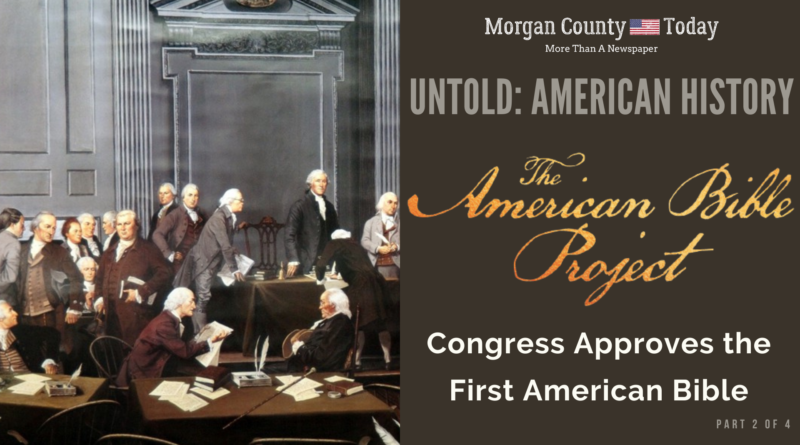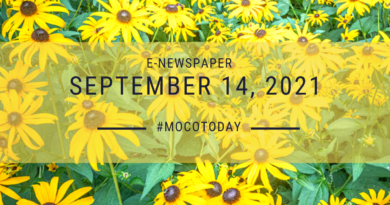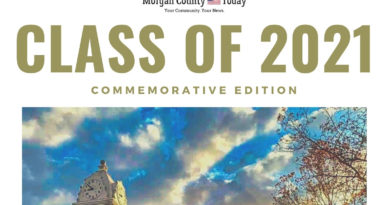Congress Approves the Bible
As seen on The American Bible Project’s website.
The Only Bible Approved by Congress
By 1777, the War of the American Revolution had entered its second year. Since the fateful firing of the “first shot” on Lexington Green, the Continental Congress, sitting in Philadelphia, had been required to make many crucial decisions, both military and political.
Now, in July 1777, a petition signed by three clergymen was placed before that dedicated body of colonial representatives, calling for a determination of an entirely different nature.
The embargo on trade with Britain had cut off our supply of Bibles. In addition, the British royal license on the Bible made it illegal to print the King James version in America. For these reasons, America was running out of Bibles. Thus, three pastors wrote to our Founders in Congress.
To the honourable Continental Congress of the United States of North America now sitting in Philadelphia.
Honoured Gentlemen
We the Ministers of the Gospel of Christ in the City of Philadelphia, whose names are under written, taking it into our serious consideration that in our present circumstances, books in general, and in particular, the holy Scriptures contained in the old and new Testaments are growing so scarce and dear, that we greatly fear that unless timely care be used to prevent it, we shall not have bibles for our schools and families, and for the publick worship of God in our churches.
We therefore think it our duty to our country and to the churches of Christ to lay this danger before this honourable house, humbly requesting that under your care, and by your encouragement, a copy of the holy Bible may be printed, so as to be sold nearly as cheap as the common Bibles, formerly imported from Britain and Ireland, were sold.
The number of purchasers is so great, that we doubt not but a large impression would soon be sold, But unless the sale of the whole edition belong to the printer, and he be bound under sufficient penalties, that no copy be sold by him, nor by any retailer under him, at a higher price than that allowed by this honourable house, we fear that the whole impression would soon be bought up, and sold again at an exorbitant price, which would frustrate your pious endeavours and fill the country with just complaints.
We are persuaded that your care and seasonable interposition will remove the anxious fears of many pious and well disposed persons; would prevent the murmurs of the discontented; would save much money to the United States; would be the means of promoting Christian knowledge in our churches, and would transmit your names with additional honour to the latest posterity.
Our sincere prayers shall ever be for your welfare and prosperity, and we beg leave with the greatest respect to subscribe our selves
Honoured GentlemenYour most obedient humble servantsFrancis AlisonJohn Ewing
William Marshalle
Congress Considers the Bible
The petition was referred to a committee of three, which included John Adams, the future second president of the United States. Adams and the others (Daniel Roberdeau and Jonathan Bayard Smith) drafted a questionnaire on Bible printing for the printers in Philadelphia. Among these printers was Robert Aitken, who had served as the appointed printer for the Journals of Congress since September 1776. (Aitken would continue as the appointed printer until May 1778.) Notably, Aitken published the first volume of the Journals containing the Declaration of Independence.
Back in Congress, the petition was reported on again on September 11, 1777. In the report, John Adams and the others stated that the committee had “conferred fully with the printers, etc. in this city and are of the opinion, that the proper types for printing the Bible are not to be had in this country, and that the paper cannot be procured, but with such difficulties and subject to such casualties as render any dependence on it altogether improper….”
Therefore, the report continued, since “the use of the Bible is so universal, and its importance so great … your committee recommend that Congress will order the Committee of Commerce to import 20,000 Bibles from Holland, Scotland, or elsewhere, into the different ports of the states in the Union.”
Yet, on that day, Congress was also focused on more pressing matters. That same day American General George Washington was fighting the Battle of the Brandywine. At the same time, British General John Burgoyne was on his way toward Saratoga. Before long, Philadelphia would he occupied by the British troops of General Sir William Howe, and Congress itself would flee to Lancaster and then to York.
While the motion carried by a narrow margin, seven to six, a subsequent motion was passed ordering “that the consideration thereof be postponed to Saturday next.” However, since nothing more is known concerning this resolution, it is doubted whether the beleaguered Congress ever took steps to effect its implementation.
Adams, Aitken, and the Bible
Meanwhile, several weeks after John Adams and the others had sent the questionnaire on Bible printing to Robert Aitken, Aitken published the first New Testament in America. Aitken placed an advertisement for his New Testament in the Pennsylvania Evening Post on August 28, 1777.
It is interesting to consider that either John Adams gave Robert Aitken the idea to print the first New Testament in America or the timing was quite a coincidence. Finding the demand high for his New Testament, for the next five years, Aitken published a new edition each year.
Thus, the seeds had been planted for the first American Bible. Indeed, the work done so far would prove to be a warm-up to the main event: not only the printing of a New Testament which was possibly influenced by John Adams, but a complete edition of the Holy Scriptures which would become the only Bible approved by Congress.
Adapted from the following source: Hills, Margaret T., The English Bible in America, New York: American Bible Society and The New York Public Library, 1961.
To read more in this series visit theamericanbible.org also visit their facebook page.




